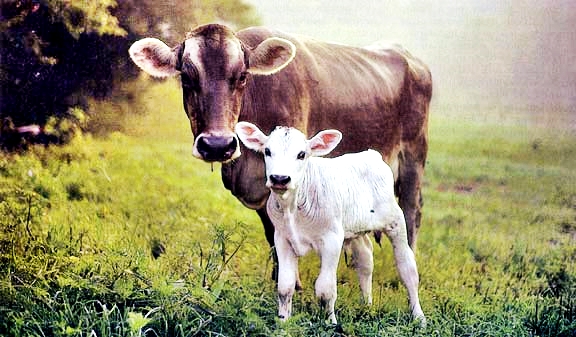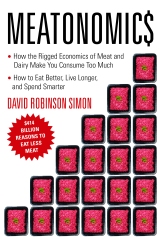Prior to the publication of Meatonomics, the publisher deemed the three paragraphs below “overly sentimental” and insisted on deleting them. Reprinted with appropriate sentimentality.

The most heartbreaking feature of today’s hellish, industrial meat production systems is that none of the billions of animals who spend their entire lives as prisoners will ever experience the slightest affection from, or fellowship with, another living being. They’ll be stripped from their mothers just when the maternal relationship is most craved by mother and child. Some will never know a mother’s touch or call, nor taste a mother’s milk. The one truly valuable asset they possess, a sense of personal dignity, will be stolen from them and tossed away without a care. They’ll be jammed into such close spaces with others of their own species that rather than develop healthy social networks, they’ll live in a state of constant hostility and fear. They’ll be forced to compete daily with their comrades for food, space and other scarce resources. Some will be pecked or bitten to death by their fellows. They’ll all lead lives of misery in painful parallel, in a kind of solidarity of time, place and debilitating stress.
As to their unhealthy relationships with the humans who cross their paths, these will be the schizophrenic nightmares of a Jekyll and Hyde story. Sometimes they’ll receive food or water from their captors, sometimes a kick or a punch, and sometimes an excruciating mutilation like a castration, beak amputation, tail docking or broken wing or limb. They’ll never receive the slightest caress or caring touch from their minders, never the slightest show of kindness or concern. Stuck in pathetic dependence on those they fear, they can only come to see humans as unpredictable and untrustworthy. Imagine a psychopathic kidnapper offering you a sandwich one minute, and beating you the next.
There’s no humanity whatsoever in these factory systems – that is to say, there’s no evidence of any human attribute other than the shallowest desire to make a profit. It’s hard to imagine a more perfect hell for the animals we debase and insult in this manner. It’s an embarrassment to humankind that in our treatment of our fellow planetary voyagers, we’ve forsaken the best qualities of our species – compassion, mercy, and kindness, for the basest – greed, cruelty and violence. Unfortunately, that’s simply the bleak nature of the factory farming systems that produce almost all the meat, eggs and dairy consumed in the industrialized world.

A gem of a book I’ve recommended widely. Thank you for the missing paragraphs, now printed and inserted in my copy. The perversion of the “meat” industry cannot be overstated enough.
You, who took the time and effort to educate those of us willing to learn, are owed an unrepayable debt. All we can do is spread your word and use your book as reference for our own humble attempts at exposing the shameful, gory state of savagery in which we still live.
In awe of you and your work. — Dolores Proubasta, Fayetteville AR
Thank you for your kind words and for recommending the book! That’s wonderful to hear.
Appealing to human compassion, mercy, and kindness may be the single best way to bring change in human food choice. Meat is unnecessary, unnatural, and abnormal in the human diet from a health perspective. The carbon footprint argument about the role meat plays in climate change has little influence on food choice. Please continue to focus on what it means to be human in your arguments to transform the food system.
We have all worked with editors whose concept of the world and the material connections between conditions and senses is framed by narrow and static views. There seems to be a dictat to redact anything new or original. These paras are transformational and add value to a quantification of the anthroplogical machine of extraction from other life. If one subscribes to teleology then, you are pointing to a life denied for these critters.
One sentence I contest is: “There’s no humanity whatsoever in these factory systems – that is to say, there’s no evidence of any human attribute other than the shallowest desire to make a profit.” I view the human attribute as one which seeks to control and take from others with indifference and an absence of alterity. If you would consider that rather bleak analysis then your evocation of senses which form multispecies emotions becomes the most unsentimental description ever written of what factory farms mean to their desensitized beings.
I am very pleased the Meatonomic$ project continues because it stands in the gateway of how humans experience the haunted and commodified lingering presence of the critters who have been consumed.
Thanks John. Good point re the “normal” state of being human. Doesn’t bode well for the species, I’m afraid.
What purpose does mankind have left on earth ?
None, in my view. The planet’s other inhabitants will be far better off when we’re gone.
What purpose does mankind have left on earth?
[…] “debasement” of animals in industrial meat production systems, subsequently appeared on his website under the heading: “Reprinted with appropriate […]
Can you eat meat and credibly care about climate change? If the answer is no, isn’t one way to get people to switch to a vegetarian or vegan diet to challenge them on that?
I fully support the Vegan-ism and wish I had the courage and will to be one myself (I feel with young children it would be quite difficult) but I have a question
Curious, in the case I own some chickens and look after them well, like pets, would eating the eggs still be against the true ideals Vegan-sim ?
[…] on the “debasement” of animals in industrial meat production systems, subsequently appeared on his website under the heading: “Reprinted with appropriate […]
[…] on the “debasement” of animals in industrial meat production systems, subsequently appeared on his website under the heading: “Reprinted with appropriate […]
[…] on the “debasement” of animals in industrial meat production systems, subsequently appeared on his website under the heading: “Reprinted with appropriate […]
[…] on the “debasement” of animals in industrial meat production systems, subsequently appeared on his website under the heading: “Reprinted with appropriate […]
[…] on the “debasement” of animals in industrial meat production systems, subsequently appeared on his website under the heading: “Reprinted with appropriate […]
[…] in un libro appena pubblicato negli Stati Uniti, dove ha fatto molto rumore, intitolato “Meatonomics”. Simon, infatti, afferma di voler togliere a tutti l’argomento della libertà di scelta spesso […]
[…] costi della carne negli USA. Sul tema è anche appena uscito il libro di David Robinson Simon, Meatonomics, che racconta i risvolti economici dei consumi di carne in crescita in tutto il mondo al servizio […]